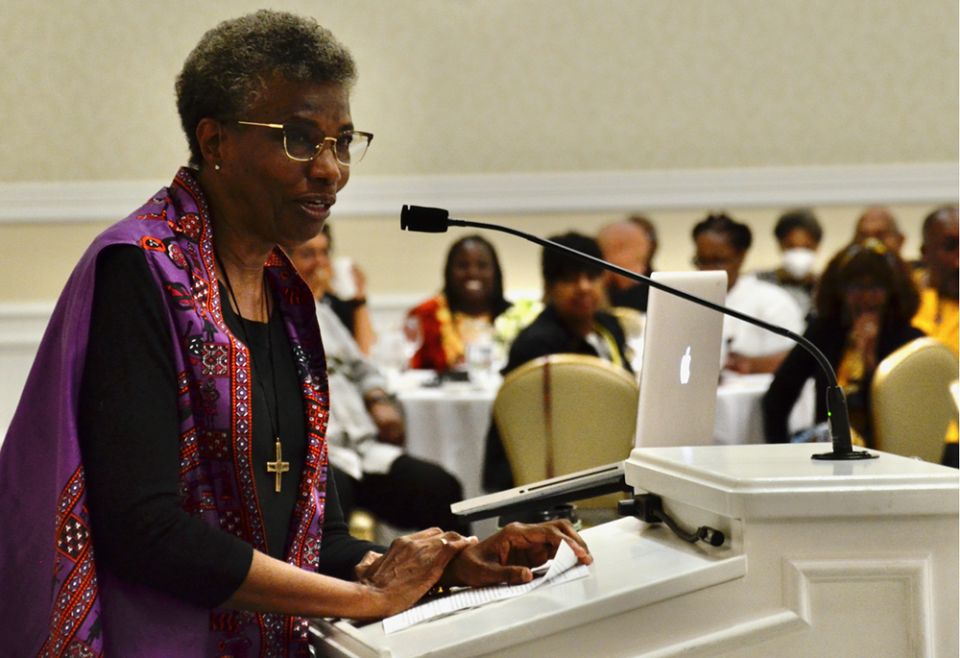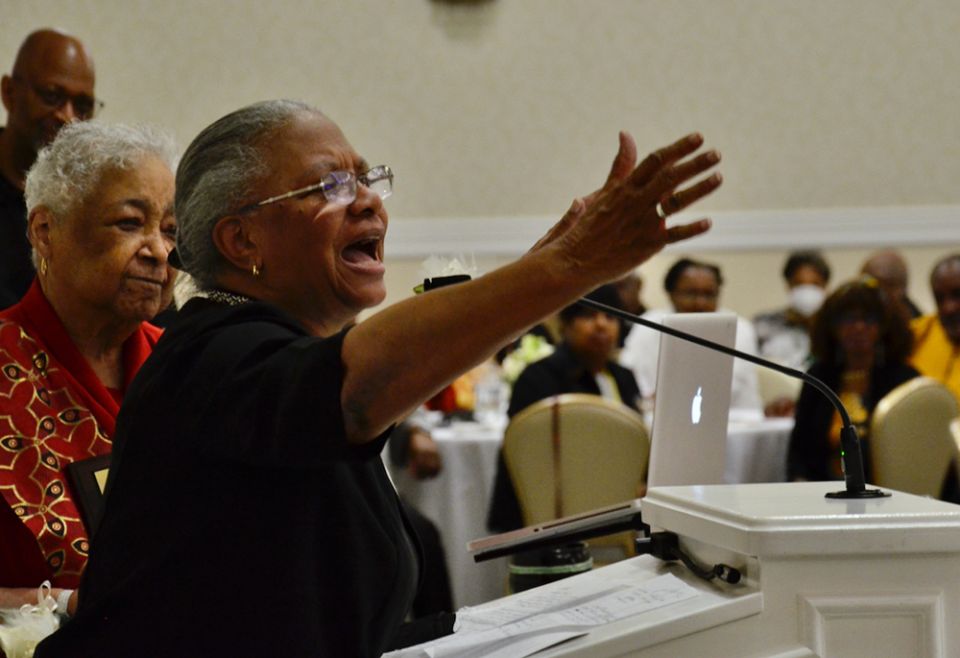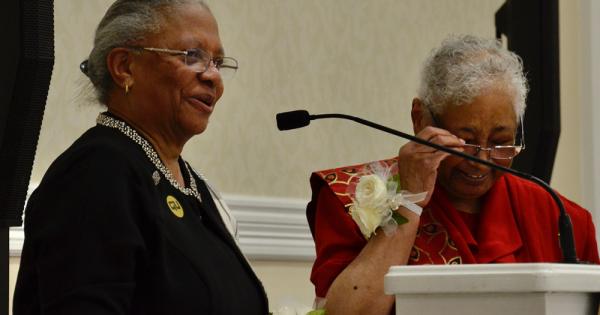Sr. Addie Lorraine Walker of the School Sisters of Notre Dame speaks July 27 to members of the National Black Sisters’ Conference, which met July 23-28 at the University of Notre Dame. Walker was elected chairman of the group at the meeting. At right is Past President Sr. Josita Colbert. (RSG Photo/Dan Stockman)
Notre Dame, Indiana — The new president of the National Conference of Black Sisters closed the group’s annual gathering with an enthusiastic and impassioned call for black sisters, clergy, deacons and seminarians to stand with her in testimony that black lives matter.
Sr. Addie Lorraine Walker of the School Sisters of Notre Dame was elected to lead the 54-year-old conference at the group’s joint meeting with three other black Catholic groups and also received the conference’s Harriet Tubman Award, which honors leaders inspiring.
In her acceptance speech for the prize on the last evening of the gathering, July 27, she repeatedly returned to one of the themes of the conference: “Sawabona“, a South African greeting meaning “I see you”.
“Sawabona!” exclaimed Walker. “We see you. I see you. I love you. I respect you. I am with you.”
Walker said she would only accept the award if those in the banquet hall accepted the responsibility that comes with being black in a white-dominated American Catholic church.
“If we can stick together, then I accept this award,” she said.

Sr. Patricia Chappell of the Sisters of Notre Dame de Namur speaks July 27 to members of the National Conference of Black Sisters at the University of Notre Dame. (RSG Photo/Dan Stockman)
In a previous interview, Walker said she plans to focus her presidency on helping black people defend themselves in a society and institutions based on racism.
“We need to be leaders, to help black people assert ourselves rather than waiting for others to assert us,” she told Global Sisters Report. “We claim a new space for ourselves with new energy to revitalize our community.”
More than 150 people, including more than 50 sisters, attended the conference, which was held July 23-28 at the University of Notre Dame. For the past several decades, the conference has been a joint meeting with the National Conference of Black Sisters, the National Black Catholic Clergy Caucus, the National Association of Black Catholic Seminarians, and the National Association of Black Catholic Deacons. Participants held business meetings, engaged in contemplation and dialogue, attended Mass, and celebrated with a closing banquet.
It was the first time in two years that the groups had met in person, and many said it was especially meaningful to be physically together.
“We come together at a critical time because of all that we have been through. [in the last two years] and the challenges we will continue to face,” said Sr. Nicole Trahan, a Marianist Sister and columnist for GSR who was elected secretary. “It’s an amazing opportunity to come together and learn how we can meet community needs.”
Sr. Anita Baird of the Daughters of the Heart of Mary, who just completed a term on the board of the National Conference of Black Sisters, said the gathering showed both the challenges and the opportunities for black sisters.
“Unfortunately, we still have as much work today as we did in 1968 when we were founded, and in some ways more work – the institutional racism is more insidious,” Baird said. “We’re polarized as a nation; we’re polarized as a church. It’s important for us to come together as black Catholics to model what the church should look like.”
Sr. Barbara Beasley, founding member of the Congregation of Our Lady of Charity of the Good Shepherd, pointed out the many young faces in the crowd.
“We went back to having very, very many young black members,” Beasley said. “We have to recognize that they have as much to give as they have to learn.”
Social worker Sr. Eva Marie Lumas said the black sisters need each other.
“Most often we are in religious communities where we are one or two [Black sisters] throughout the community,” Lumas said. “We need each other to be our best, true and whole.
Sr Gwynette Proctor, a Sister of Notre Dame de Namur, said being together physically after so long “enriches my soul”.
“We didn’t know how much we needed it,” Proctor said. “Zoom just isn’t the same.”

Sr. Addie Lorraine Walker of the School Sisters of Notre Dame speaks July 27 to members of the National Black Sisters’ Conference, which met July 23-28 at the University of Notre Dame. Walker was elected chairman of the group at the meeting. (RSG Photo/Dan Stockman)
Walker grew up in Texas, where her grandmother enrolled her in a Catholic school. Her Methodist parents rejected her request to become a Catholic – she says she was drawn to “the smoke, the bells and the foreign language” at Mass – but she kept asking until they gave in. She earned a bachelor’s degree in chemistry from Southwest Texas State University in 1971 and worked as a research chemist before entering her community in 1976.
She is professor of theology at the Oblate School of Theology, founding director of the Sankofa Institute for African-American Pastoral Leadership, and one of the authors of the Leadership Conference of Women Religious book on the apostolic visitation, sisterhood power.
Walker said that as chair, she also plans to focus on another conference theme: “Ubuntu,” a Bantu word meaning “I am because we are.”
“We have to have this openness with each other, with God, with the church and with the world,” she said.
Do you like what you read ? Sign up for GSR eNewsletters!

